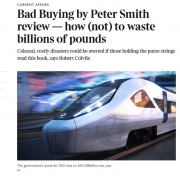What’s In Store for Bad Buying in 2023?
As we enter 2023, what do the prospects for Bad Buying look like? No doubt, we will continue to see regular procurement and contract related fraud and corruption. It will be greeted on discovery by the CFO explaining that “it was a very sophisticated fraud”. Usually, that is simply not true. What the CFO (or CPO) means is “our processes were rubbish and wide open to criminal exploitation, but I can’t say that because you might question why I’m paid a six or seven figure salary to manage this shambolic process”.
Talking of fraud, the long-running controversy over PPE procurement in the UK will continue in 2023, with an announcement this week that the government is going to court over the supply of gowns from supplier PPE Medpro. One paragraph in the Guardian report on this leapt out at me.
“The legal claim states that the DHSC had paid PPE Medpro the full £122m for the 25m gowns by 28 August 2020. This was before any of the gowns had been inspected in the UK, and before all the gowns had arrived. Health officials rejected the gowns after a first inspection at the NHS depot in Daventry on 11 September 2020”.
I know the situation was desperate back in 2020, but to pay the full contracted amount before inspecting the product at all – it just seems incredible that any procurement professional would agree to that. Anyway, more to come on PPE this year, no doubt with more discussion of links to politicians, dodgy suppliers and billions of wasted money.
Moving on from PPE, the public sector (in every country) will continue to struggle with complex and technologically complex procurement in areas such as Defence and major IT programmes. We can hope that the UK Ministry of Defence sorts out the long-running Ajax armoured vehicle fiasco, another programme with potentially billions of pounds on the line. The latest comments in December during a House of Lords debate seemed a little more positive but let’s wait and see. It’s not just the UK of course. Just before Christmas, we saw reports in the German press and on the Jane’s website about some of their army’s vehicles following a major training exercise.
“Germany suspended procurement of the Puma infantry fighting vehicle (IFV) on 19 December after 18 of the vehicles broke down in an exercise preparing for their first assignment to the NATO Response Force Very High Readiness Joint Task Force (VJTF) in January, when Germany takes over command of the force”.
But the UK MOD seems to have issues with low tech procurement too. Recent reports suggest that the organisation still hasn’t got to grips with maintenance of military housing, a long-running example of Bad Buying on several counts. It started with a dreadful PFI programme that cost the taxpayer billions, and now the relatively new contract for looking after the homes is not delivering satisfactory outcomes for those who live there. A contract management failure maybe?
Of course, it isn’t just the public sector that demonstrates Bad Buying, although the private sector is better at keeping failures hidden. I would argue that the professional services market (audit, consultancy, legal services) demonstrates a long-term failure of markets, procurement and buyers generally. Last month, the 100 Group, which represents the Finance Directors of some of the UK’s biggest firms, wrote to the “big four” audit firms to complain about rising fees. To which we might respond – well, you are the clients, why don’t you do something about it?
In truth, there is an oligopoly in the audit market. So the firms can get away with saying they are “investing in audit quality,” whilst in practice the extra revenue is channelled into paying their partners more and more each year – £1 million plus now in large firms. EY also increased the salaries of its junior accountants by 13% recently – nice for those people no doubt, but we all know that it is the clients who will pay for that generosity.
To some extent, legal service and strategy consulting has gone the same way – higher and higher salaries for firm’s partners in particular, whilst clients get exploited. Yet too many buyers are unwilling to use approaches that might mitigate cost increases, such as applying real competitive pressure, negotiating hard and skilfully, managing individual assignments more carefully, or looking at alternative suppliers to the top (and most expensive) firms.
Anyway, I’ll leave you with four thoughts for the New Year – maybe they could form the basis of some procurement new year resolutions for your organisation!
- Check that you have everything in place to minimise the risk of fraud and corruption in your procurement activities. You can’t make it 100% criminal-proof, but you can make wrongdoing much more difficult by applying reasonably basic processes, systems and policies.
- Competition is still the best mechanism invented to drive positive outcomes and outputs from suppliers and contracts. Use it well and widely.
- Be a little cynical – well, maybe more than a little – about what suppliers promise you and the claims they make about their products and services, particularly in areas such as technology.
- Organisations that are “good at procurement” don’t just focus on the skills and knowledge of their procurement teams – they understand that a wide range of people in the organisation need to understand their own role in the end-to-end process. They must also have the right commercial skills to play their part in procurement success.









Leave a Reply
Want to join the discussion?Feel free to contribute!